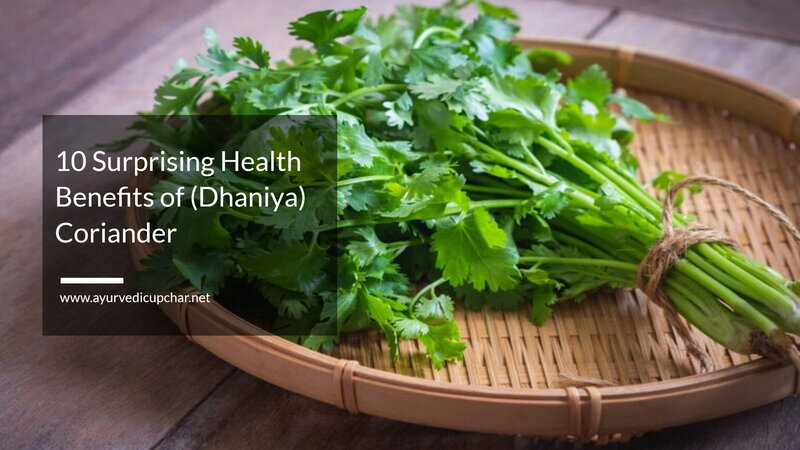10 Surprising Health Benefits of (Dhaniya) Coriander
 Cilantro, Coriander, or so-called Dhaniya is an aromatic plant that is widely used in various regions as a flavor but also used for digestive problems including stomach upset, loss of appetite, nausea, diarrhea, intestinal spasms, and gas or flatulence.
Cilantro, Coriander, or so-called Dhaniya is an aromatic plant that is widely used in various regions as a flavor but also used for digestive problems including stomach upset, loss of appetite, nausea, diarrhea, intestinal spasms, and gas or flatulence.
This plant is very popular in many kitchens worldwide for its aroma, and it is native to Asia. Its scientific name is Coriandrum sativum, also called coriander (although this term is used more to refer to its seeds), India Dhaniya, European coriander, or Chinese parsley.
Some breastfeeding women use coriander for the benefit of increasing milk flow. In food, coriander is used as a culinary spice and to prevent food poisoning.
It is used in the manufacture of various products, coriander is used as a flavoring agent, in medicines, and in tobacco as a fragrance, and in cosmetics and soaps.
Nutritional properties of Coriander
Coriander can lower blood sugar and even help to kill some parasites, some research does confirm it and there are currently more studies going on to know exactly how coriander works for these medicinal uses.
The truth is that coriander contains many nutritional properties that must be borne in mind because, beyond its use as a seasoning or flavoring, it is highly nutritious.
It should be noted that just a handful of fresh coriander leaves of about 10 grams can provide us with 56 mg of vitamin C, very important to strengthen the immune system and is very active in its antioxidant properties, excellent for the skin, among many things. more.
The exact amount of coriander will be providing us in turn 340 μg of vitamin A or beta-carotene, also a very powerful antioxidant and a very important nutrient for eye health.
As for minerals, the same amount of coriander will be providing us with 75 mg of calcium, 48 mg of phosphorus, and 4 mg of iron, among other things. And all this with only 27 Kcal, which is what these amounts of grass have.
Uses of Coriander in the kitchen
Coriander is an herb (when the leaves are consumed) or spice (when the seeds are consumed) widely used in various cuisines of the world, such as Hindu, Chinese, Japanese, and Latin. Coriander seeds offer intensity, and heat, and are used to season meats, pasta, curries, salads, fish, seafood, and sausages, notably accentuating their flavor.
Coriander as Ayurvedic medicine
There is much use of coriander seeds or fresh coriander or seed powder described in Ayurveda. such as being used to cure stomach-related ailments like abdominal pain, indigestion, constipation, etc.
According to the Ayurvedic text “Charaka Samhita,” coriander herb is term as Sheetaprashmana (which relieves excessive cold) and Trushnaprashamana means (which relieves excessive thirst).
It infusing fresh coriander used regularly in lukewarm water can even provide relief from abdominal cramps during menstrual flow.
1. Against salmonella
Different studies found that coriander could be as effective as gentamicin, the most common antibiotic used in the treatment of salmonella. It is believed that an essential oil contained in the herb, the dodecenal, would have an antibiotic activity capable of breaking the membrane of the salmonellosis bacteria and weakening it until it was destroyed.
2. It fights cholesterol
When blood cholesterol levels are high, the risk of cardiovascular problems increases. One option to counteract this situation is to resort to coriander since some of its acids could reduce the accumulation of this fat on the inner walls of the arteries. You can take advantage of it by drinking its infusions.
3. Ally against diabetes
Traditionally, the consumption of coriander has been associated with the regulation of blood glucose levels. Recent evidence indicates that incorporating its seeds and leaves would improve insulin sensitivity in diabetic patients, and in some cases, it could reduce glucose levels by up to 15%. There is some research that does conform to it.
4. Anti-inflammatory
Coriander has anti-inflammatory agents that are ideal for supporting joint health and fighting rheumatoid arthritis. The researchers who found this benefit administered extracts of its seeds, which are rich in phytonutrients and antioxidants, in arthritis patients.
5. Natural bactericide
Coriander has traditionally been used in herbalism to prevent infection. As with Salmonella, other studies found that applying its juice to wounds destroys the cell membranes of bacteria. This interrupts the essential processes of these microorganisms, leading to their death.
6. Effective against flu
In addition to having antibacterial properties, it contains vitamins A and C that makes it a perfect ally to fight flu and colds, since it also has an expectorant action. For this reason, it is common in many home medicine cabinets that coriander infusions are raised as one of the best options to say goodbye to these diseases.
7. It is an aphrodisiac
This usage dates back to Ancient Greece, and is even mentioned in the classic Arabic novel “The Thousand and One Nights.” It was normal to prepare a drink with coriander, cinnamon, cardamom, cloves, and ginger called “hypocrás” because it was the Greek doctor Hippocrates who invented it. It was very popular in France and was given to the bride and groom on their wedding night to awaken passion.
8. For bad breath
In addition to its use in cooking, coriander is good for fighting bad breath as it cleanses the mouth of toxins and is an excellent digestive. To make a natural mouthwash, add several coriander sprigs to two cups of water and boil them for a few minutes. Then strain it, let it cool, and drink or gargle it.
9. Great digestive
Among the properties attributed by natural medicine to coriander is its diuretic effect to prevent fluid retention and eliminate toxins. In addition, it helps to evacuate food more easily, avoiding disorders such as constipation. It would also increase the absorption of nutrients, filling the body more easily.
10. Against conjunctivitis
Being one of the oldest medicinal plants, it was common for it to be used for various purposes. For example, the Egyptians and Assyrians considered coriander an ideal option against conjunctivitis, as it reduced pain and swelling. This use continues to this day since many Latin grandmothers prepare an infusion with this herb to wash their eyes.
Cautions
Although there are practically no cases of danger associated with the consumption of coriander, experts advise, as with other herbs, that pregnant women refrain from incorporating it into their diet without first consulting a doctor. Its excessive intake could also increase sensitivity to sunlight.























